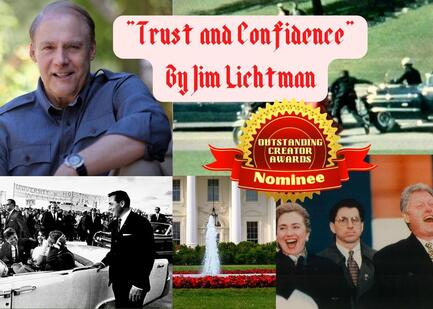|
Score: 96/100
This book is absolutely fascinating! Author Jim Lichtman has written Op-Eds for The New York Times, Huffington Post, and more. He has had featured stories and appearances in USA Today, The Washington Post, and on CNN's NewsNight with Aaron Brown. With Lichtman, we’ve landed on a goldmine of information that seems almost too good—perhaps even taboo--to have access to. Yet here it is. “Trust and Confidence” is a book that involves the ethical dilemma faced by members of the United States Secret Service, specifically concerning the Bill Clinton-Monica Lewinsky scandal that dominated the president’s second term in office. That dilemma can be summed up as: is it ethical for the Secret Service to remain silent about the president’s personal/private actions and conversations? Is it ethical or moral for the Secret Service to keep these things to themselves in order to ensure the continued trust and confidence between the person and office of the president and the protective body of the Secret Service? Now, you might be thinking as a typical, perhaps somewhat disgruntled citizen: truth and transparency are king and queen. But are they really? For practical purposes, is it sometimes true that the less you know the better when the greater good is considered? Case in point: what if a breach in trust and confidence between the office of the president and the Secret Service resulted in a loss of physical proximity between the two? Consider for practical purposes if Clint Hill and the rest of the Secret Service members in Dallas, Texas on November 22, 1963 had not been asked to give JFK and his vehicle more distance before the assassination. Would Lee Harvey Oswald (or another assassin) have had such clear shot? Would one of the Secret Service members have obscured or absorbed some or all of the second or third (deadly) shot? Would the assassination have even been successful at all? The same arguments could be made for many other presidential assassinations and assassination attempts. Hill insists that he was less than a second from being able to save the president and changing the course of history. In many cases, proximity (closeness to the president) may have very well saved the president. Author Lichtman interviewed Lewis Merletti, the former director of the Secret Service under President Clinton, nine years after the Lewinsky scandal. Merletti was consistently in arms reach of the most powerful man in the country (and the world) and likely was there for many of his meetings with senators and world leaders. Throughout the book, we hear primarily from Merletti as he discusses the Clinton-Lewinsky scandal. As fascinating as that all is (and it is, indeed, fascinating) what’s even more fascinating is the contextual information and asides we get from Merletti. In hindsight, it’s mindboggling to hear how Osama Bin Ladin was already a concern in the 90s. It’s striking to hear how the FBI responded to the Waco siege with the Branch Davidians under David Koresh. There are times in this that feel like the origin story of our current politicians. At one point, you have a letter to Senator (and future presidential candidate) John Kerry opposing the release of information from former Secret Service member John Syphrit for the sake of preserving what I’ve started calling the “protective function privilege” of the Secret Service—the unspoken privilege of the Secret Service to keep secrets for the sake of life and safety. You read about how George Bush Sr. vouched for the Secret Service and claimed to have never heard the utter a negative word about their protectees. You read about how everyone from Lewinsky to the White House staff sound petrified of the idea of the “Clinton people”—supposedly Bill Clinton’s inner circle—who sound like those who keeps things confidential whenever possible. However, this information seems to be presented without inherent bias. It’s just information. It’s just facts. It’s just the way it is. In an age in which the mainstream media seems to be always trying to spin stories to fit a political agenda, this book seems to have no agenda. This non-fiction, well-researched book reads like a crime drama or a mystery, but it’s real! There are times when we felt like John Grisham wrote this. The dialogue is fast and tense, but it’s real! You feel like you’re right in there listening to the likes of Merletti and Hill talk about their experiences. It was like going down a big slide—exhilarating yet effortless and easy. What a promising book! Keep up to date with Jim Lichtman and the book's release at ethicsstupid.com
0 Comments
Leave a Reply. |
Archives
July 2024
Categories |

 RSS Feed
RSS Feed